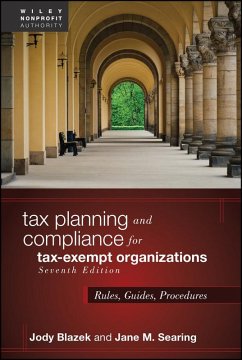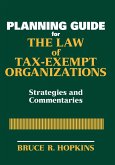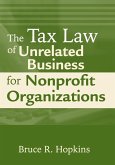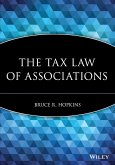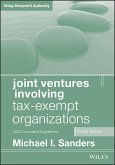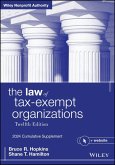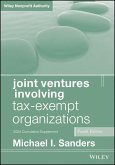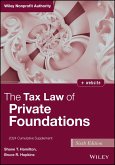Jody Blazek, Jane M Searing
Tax Planning and Compliance for Tax-Exempt Organizations
Rules, Guides, Procedures
Jody Blazek, Jane M Searing
Tax Planning and Compliance for Tax-Exempt Organizations
Rules, Guides, Procedures
- Gebundenes Buch
- Merkliste
- Auf die Merkliste
- Bewerten Bewerten
- Teilen
- Produkt teilen
- Produkterinnerung
- Produkterinnerung
- Weitere 9 Ausgaben:
- Broschiertes Buch
- eBook, ePUB
- eBook, ePUB
- eBook, ePUB
- eBook, ePUB
- eBook, PDF
- eBook, PDF
- eBook, PDF
- eBook, PDF
An indispensable roadmap for the complex maze of tax-exempt rules and regulations Tax Planning and Compliance for Tax-Exempt Organizations: Rules, Guides, Procedures, Seventh Edition, by Jody Blazek and Jane M. Searing, is a comprehensive and authoritative update to the widely read gold standard in nonprofit organization tax planning. It's been exhaustively updated to include the latest changes to the tax code, new IRS rulings, court decisions, and regulations issued since 2020. You'll learn how to establish eligibility for tax-exempt status and maintain that status through compliant tax…mehr
Andere Kunden interessierten sich auch für
![Planning Guide for the Law of Tax-Exempt Organizations Planning Guide for the Law of Tax-Exempt Organizations]() Bruce R HopkinsPlanning Guide for the Law of Tax-Exempt Organizations74,99 €
Bruce R HopkinsPlanning Guide for the Law of Tax-Exempt Organizations74,99 €![The Tax Law of Unrelated Business for Nonprofit Organizations The Tax Law of Unrelated Business for Nonprofit Organizations]() Bruce R HopkinsThe Tax Law of Unrelated Business for Nonprofit Organizations80,99 €
Bruce R HopkinsThe Tax Law of Unrelated Business for Nonprofit Organizations80,99 €![The Tax Law of Associations The Tax Law of Associations]() Bruce R HopkinsThe Tax Law of Associations76,99 €
Bruce R HopkinsThe Tax Law of Associations76,99 €![Joint Ventures Involving Tax-Exempt Organizations, 2023 Supplement Joint Ventures Involving Tax-Exempt Organizations, 2023 Supplement]() Michael I SandersJoint Ventures Involving Tax-Exempt Organizations, 2023 Supplement137,99 €
Michael I SandersJoint Ventures Involving Tax-Exempt Organizations, 2023 Supplement137,99 €![The Law of Tax-Exempt Organizations The Law of Tax-Exempt Organizations]() Bruce R HopkinsThe Law of Tax-Exempt Organizations176,99 €
Bruce R HopkinsThe Law of Tax-Exempt Organizations176,99 €![Joint Ventures Involving Tax-Exempt Organizations, 2024 Supplement Joint Ventures Involving Tax-Exempt Organizations, 2024 Supplement]() Michael I SandersJoint Ventures Involving Tax-Exempt Organizations, 2024 Supplement139,99 €
Michael I SandersJoint Ventures Involving Tax-Exempt Organizations, 2024 Supplement139,99 €![The Tax Law of Private Foundations The Tax Law of Private Foundations]() Shane T HamiltonThe Tax Law of Private Foundations139,99 €
Shane T HamiltonThe Tax Law of Private Foundations139,99 €-
-
-
An indispensable roadmap for the complex maze of tax-exempt rules and regulations Tax Planning and Compliance for Tax-Exempt Organizations: Rules, Guides, Procedures, Seventh Edition, by Jody Blazek and Jane M. Searing, is a comprehensive and authoritative update to the widely read gold standard in nonprofit organization tax planning. It's been exhaustively updated to include the latest changes to the tax code, new IRS rulings, court decisions, and regulations issued since 2020. You'll learn how to establish eligibility for tax-exempt status and maintain that status through compliant tax preparation and disclosure. You'll also discover how to properly handle mergers and terminations. This resource covers every step of a tax-exempt organization's lifecycle. This book includes access to an annual supplement to keep subscribers current on changes in IRS policies, court decisions, and related issues, as well as easy-to-use guides that highlight critical concerns, like tax-exempt eligibility, reporting changes to the IRS, reasonable compensation evaluations, and tax compliance. An essential inclusion in the libraries of everyone who manages or advises tax-exempt organizations, Tax Planning and Compliance for Tax-Exempt Organizations is an indispensable guide for tax and accounting professionals. We would like to thank the following members of Deloitte Tax, Global Center for Excellence in Philanthropy team and the Washington National Tax practice for their indispensable contributions in researching, editing, and updating this Seventh Edition. Jocelyne Miller, Jessica Karantonis, Rebekah Stanley, Mike Schlect, Jeff Frank, Maria De Ramos, Kristina Rasmussen, Amber Hopp, Sarah Redden, Stegin O'Neill, Emily Samuels, Morgan Wright, Eduard Braila, Adam Saleh, Stephanie Prieto, Alan Nguye, Cherry Zhang, Rachel Wood, and Rafe Hauser. We could not have done it without you!
Produktdetails
- Produktdetails
- Verlag: Wiley
- 7th edition
- Seitenzahl: 880
- Erscheinungstermin: 6. Mai 2025
- Englisch
- Abmessung: 256mm x 178mm x 38mm
- Gewicht: 1520g
- ISBN-13: 9781394317110
- ISBN-10: 1394317115
- Artikelnr.: 71869672
- Herstellerkennzeichnung
- Libri GmbH
- Europaallee 1
- 36244 Bad Hersfeld
- gpsr@libri.de
- Verlag: Wiley
- 7th edition
- Seitenzahl: 880
- Erscheinungstermin: 6. Mai 2025
- Englisch
- Abmessung: 256mm x 178mm x 38mm
- Gewicht: 1520g
- ISBN-13: 9781394317110
- ISBN-10: 1394317115
- Artikelnr.: 71869672
- Herstellerkennzeichnung
- Libri GmbH
- Europaallee 1
- 36244 Bad Hersfeld
- gpsr@libri.de
JODY BLAZEK was a founder and partner in Blazek & Vetterling, a Houston-based CPA firm focused on tax, auditing, and financial planning for exempt organizations and the people who create, fund, and work with them. She is the author of six books in the Wiley Nonprofit Series, including Financial Planning for Nonprofit Organizations Made Easy and The Tax Law of Private Foundations, Sixth Edition. She is a frequent speaker at nonprofit symposia. JANE M. SEARING is a managing director in Deloitte Tax's Private Wealth practice, and the Global Center for Excellence in Philanthropy. She specializes in tax-exempt organizations, specifically private foundations, and philanthropic planning, and focuses on helping family offices and ultra-high-net-worth individuals execute their philanthropic vision. Searing is a frequent speaker and writer, a certified public accountant in Washington, Hawaii, and Colorado, and a member of the American Institute of Certified Public Accountants.
Introduction: An Indispensable Roadmap for the Complex Maze of Tax-Exempt
Rules and Regulations xiii
Chapter 1 Distinguishing Characteristics of Tax-Exempt Organizations 1
1.1 Differences between Exempt and Nonexempt Organizations 8
1.2 Nomenclature 10
1.3 Control 11
1.4 Role of the Internal Revenue Service 12
1.5 Suitability as an Exempt Organization 12
1.6 Start-Up Costs, Governance, Tax, and Financial Considerations 15
1.7 Choosing a Form for the New Exempt Organization 18
Chapter 2 Qualifying Under IRC §501(c)(3) 23
2.1 Organizational Test 25
2.2 Operational Test 31
Chapter 3 Public Charities 57
3.1 Distinctions Between Public and Private Charities 58
3.2 "Inherently Public Activity" and Broad Public Support: §509(a)(1) 59
3.3 Community Foundations 72
3.4 Service-Providing Organizations: §509(a)(2) 81
3.5 Difference Between §509(a)(1) and §509(a)(2) 83
3.6 Supporting Organizations: §509(a)(3) 91
3.7 Testing for Public Safety: §509(a)(4) 106
Chapter 4 Religious Organizations 107
4.1 Characteristics of Religious Organizations 108
4.2 Churches 112
4.3 Religious Orders 125
4.4 Religious and Apostolic Associations 126
Chapter 5 Charitable Organizations 129
5.1 Relief of the Poor 131
5.2 Promotion of Social Welfare 136
5.3 Lessening the Burdens of Government 146
5.4 Advancement of Religion 149
5.5 Advancement of Education and Science 149
5.6 Promotion of Health 150
5.7 Cooperative Hospital Service Organizations 170
Chapter 6 Other Charitable Organizations Qualifying Under IRC §501(c)(3)
Charitable Purposes 171
6.1 Educational Purposes 172
6.2 Literary Purposes 186
6.3 Scientific Purposes 187
6.4 Testing for Public Safety 191
6.5 Fostering National or International Amateur Sports Competition (But
Only If No Part of Its Activities Involves the Provision of Athletic
Facilities or Equipment) 192
6.6 Prevention of Cruelty to Children or Animals 194
Chapter 7 Civic Leagues, Other Nonprofits, and Social Welfare Organizations
Exempt Under IRC §501(c)(4) 195
7.1 Comparison of (c)(3) and (c)(4) Organizations 197
7.2 Qualifying and Nonqualifying Civic Organizations 204
7.3 Local Associations of Employees 211
7.4 Neighborhood and Homeowner's Associations 212
7.5 Disclosures of Nondeductibility 216
Chapter 8 Governmental Units, Component-Created Entities, and Title-Holding
Corporations 225
8.1 Governmental Units 225
8.2 Political Subdivisions 228
8.3 Integral Parts 229
8.4 Eligibility for Obtaining and Benefits/Detriments of Holding IRC
§501(c)(3) Tax-Exempt Status 231
8.5 Instrumentalities 233
8.6 Affiliates 237
8.7 IRC §501(c)(2) Title-Holding Corporations 238
8.8 IRC §501(c)(25) Title-Holding Corporations 243
Chapter 9 Private Inurement and Intermediate Sanctions 245
9.1 Defining Inurement 248
9.2 Salaries and Other Compensation 250
9.3 Setting Salary 253
9.4 Housing and Meals 255
9.5 Purchase, Lease, or Sale of Property or Services 256
9.6 Loans and Guarantees 258
9.7 For-Profit to Nonprofit and Vice Versa 258
9.8 Services Rendered for Individuals 259
9.9 Joint Ventures 261
9.10 Intermediate Sanctions 262
Chapter 10 Private Foundations-General Concepts 277
10.1 Why Private Foundations Are Special 277
10.2 Special Rules Pertaining to Private Foundations 279
10.3 Application of Taxes to Certain Nonexempt Trusts 291
10.4 Termination of Private Foundation Status 293
Chapter 11 Excise Tax Based on Investment Income: IRC §4940 317
11.1 Formula for Taxable Income 318
11.2 Net Capital Gains 327
11.3 Deductions from Gross Investment Income 333
11.4 Tax-Planning Considerations 338
11.5 Foreign Foundations 341
11.6 Timely Payment of Excise Tax 343
11.7 Tax on Private Colleges and Universities 344
11.8 Exempt Operating Foundations 345
Chapter 12 Self-Dealing: IRC §4941 347
12.1 Definition of Self-Dealing 348
12.2 Sale, Exchange, or Lease of Property 352
12.3 Loans 362
12.4 Compensation 365
12.5 Transactions That Benefit Disqualified Persons 372
12.6 Payments to Government Officials 380
12.7 Sharing Space, People, and Expenses 381
12.8 Indirect Self-Dealing 384
12.9 Property Held by Fiduciaries 385
12.10 Issues Once Self-Dealing Occurs 389
Chapter 13 Minimum Distribution Requirements: IRC §4942 395
13.1 Assets Used to Calculate Minimum Investment Return 397
13.2 Measuring Fair Market Value 404
13.3 Distributable Amount 410
13.4 Qualifying Distributions 412
13.5 Private Operating Foundations 433
13.6 Satisfying the Distribution Test 443
Chapter 14 Excess Business Holdings and Jeopardizing Investments: IRC
§§4943 and 4944 451
14.1 Excess Business Holdings 451
14.2 Jeopardizing Investments 462
14.3 Program-Related Investments 467
14.4 Penalty Taxes 473
Chapter 15 Taxable Expenditures: IRC §4945 479
15.1 Lobbying 481
15.2 Voter Registration Drives 486
15.3 Grants to Individuals 486
15.4 Grants to Public Charities 498
15.5 Grants to Foreign Organizations 509
15.6 Expenditure Responsibility Grants 512
15.7 Noncharitable Expenditures 525
15.8 Excise Taxes Payable 526
Chapter 16 IRS Filings, Procedures, and Policies 529
16.1 IRS Tax Exempt and Government Entities Division 530
16.2 IRS Determination Process 534
16.3 Annual Filing of Forms 990 545
16.4 Reporting Organizational Changes to the IRS 555
16.5 Weathering an IRS Examination 559
16.6 When an Organization Loses Its Tax-Exempt Status 566
Chapter 17 Unrelated Business Income 567
17.1 IRS Scrutiny of Unrelated Business Income 572
17.2 History of the Unrelated Business Income Tax 572
17.3 Consequences of Receiving UBI 573
17.4 Definition of Trade or Business 575
17.5 What Is Unrelated Business Income? 579
17.6 "Regularly Carried On" 580
17.7 "Substantially Related" 582
17.8 Unrelated Activities 587
17.9 The Exceptions 609
17.10 Income Modifications 616
17.11 Calculating and Minimizing Taxable Income 627
17.12 Debt-Financed Property 635
17.13 Museums 642
17.14 Travel Tours 644
17.15 Publishing 645
Chapter 18 Relationships with Other Organizations and Businesses 649
18.1 Creation of a (c)(3) by a (c)(4), (5), or (6) 650
18.2 Alliances with Investors 655
18.3 Corporate Subsidiary 660
18.4 Active Business Relationships 665
Chapter 19 Electioneering and Lobbying 669
19.1 Election Campaign Involvement 670
19.2 Voter Education vs. Candidate Promotion 676
19.3 Tax on Political Expenditures 681
19.4 Lobbying Activity of §501(c)(3) Organizations 691
19.5 Permissible Amounts of Lobbying 697
19.6 Lobbying Limits for §501(c)(4), (5), (6), and Other Exempt
Organizations 701
19.7 Advocacy and Nonpartisan Analysis 702
Chapter 20 Mergers, Reorganizations, and Terminations 705
20.1 Mergers and Other Combinations 705
20.2 Reorganizations 711
20.3 Terminations 714
Chapter 21 Deductibility and Disclosures 717
21.1 Overview of Deductibility 718
21.2 The Substantiation and Quid Pro Quo Rules 731
21.3 Valuing Donor Benefits 742
21.4 Unrelated Business Income Aspects of Fund-Raising 746
Appendix 1: Labor, Agricultural, and Horticultural Organizations:
§501(c)(5) 749
Appendix 2: Business Leagues: §501(c)(6) 761
Appendix 3: Social Clubs: §501(c)(7) 781
Appendix 4: Guides for Maintaining Exempt Status 799
Appendix 5: Brief Description of Tax Sanctions Applicable to Private
Foundations 833
List of Exhibits 837
About the Authors 839
Index 841
Rules and Regulations xiii
Chapter 1 Distinguishing Characteristics of Tax-Exempt Organizations 1
1.1 Differences between Exempt and Nonexempt Organizations 8
1.2 Nomenclature 10
1.3 Control 11
1.4 Role of the Internal Revenue Service 12
1.5 Suitability as an Exempt Organization 12
1.6 Start-Up Costs, Governance, Tax, and Financial Considerations 15
1.7 Choosing a Form for the New Exempt Organization 18
Chapter 2 Qualifying Under IRC §501(c)(3) 23
2.1 Organizational Test 25
2.2 Operational Test 31
Chapter 3 Public Charities 57
3.1 Distinctions Between Public and Private Charities 58
3.2 "Inherently Public Activity" and Broad Public Support: §509(a)(1) 59
3.3 Community Foundations 72
3.4 Service-Providing Organizations: §509(a)(2) 81
3.5 Difference Between §509(a)(1) and §509(a)(2) 83
3.6 Supporting Organizations: §509(a)(3) 91
3.7 Testing for Public Safety: §509(a)(4) 106
Chapter 4 Religious Organizations 107
4.1 Characteristics of Religious Organizations 108
4.2 Churches 112
4.3 Religious Orders 125
4.4 Religious and Apostolic Associations 126
Chapter 5 Charitable Organizations 129
5.1 Relief of the Poor 131
5.2 Promotion of Social Welfare 136
5.3 Lessening the Burdens of Government 146
5.4 Advancement of Religion 149
5.5 Advancement of Education and Science 149
5.6 Promotion of Health 150
5.7 Cooperative Hospital Service Organizations 170
Chapter 6 Other Charitable Organizations Qualifying Under IRC §501(c)(3)
Charitable Purposes 171
6.1 Educational Purposes 172
6.2 Literary Purposes 186
6.3 Scientific Purposes 187
6.4 Testing for Public Safety 191
6.5 Fostering National or International Amateur Sports Competition (But
Only If No Part of Its Activities Involves the Provision of Athletic
Facilities or Equipment) 192
6.6 Prevention of Cruelty to Children or Animals 194
Chapter 7 Civic Leagues, Other Nonprofits, and Social Welfare Organizations
Exempt Under IRC §501(c)(4) 195
7.1 Comparison of (c)(3) and (c)(4) Organizations 197
7.2 Qualifying and Nonqualifying Civic Organizations 204
7.3 Local Associations of Employees 211
7.4 Neighborhood and Homeowner's Associations 212
7.5 Disclosures of Nondeductibility 216
Chapter 8 Governmental Units, Component-Created Entities, and Title-Holding
Corporations 225
8.1 Governmental Units 225
8.2 Political Subdivisions 228
8.3 Integral Parts 229
8.4 Eligibility for Obtaining and Benefits/Detriments of Holding IRC
§501(c)(3) Tax-Exempt Status 231
8.5 Instrumentalities 233
8.6 Affiliates 237
8.7 IRC §501(c)(2) Title-Holding Corporations 238
8.8 IRC §501(c)(25) Title-Holding Corporations 243
Chapter 9 Private Inurement and Intermediate Sanctions 245
9.1 Defining Inurement 248
9.2 Salaries and Other Compensation 250
9.3 Setting Salary 253
9.4 Housing and Meals 255
9.5 Purchase, Lease, or Sale of Property or Services 256
9.6 Loans and Guarantees 258
9.7 For-Profit to Nonprofit and Vice Versa 258
9.8 Services Rendered for Individuals 259
9.9 Joint Ventures 261
9.10 Intermediate Sanctions 262
Chapter 10 Private Foundations-General Concepts 277
10.1 Why Private Foundations Are Special 277
10.2 Special Rules Pertaining to Private Foundations 279
10.3 Application of Taxes to Certain Nonexempt Trusts 291
10.4 Termination of Private Foundation Status 293
Chapter 11 Excise Tax Based on Investment Income: IRC §4940 317
11.1 Formula for Taxable Income 318
11.2 Net Capital Gains 327
11.3 Deductions from Gross Investment Income 333
11.4 Tax-Planning Considerations 338
11.5 Foreign Foundations 341
11.6 Timely Payment of Excise Tax 343
11.7 Tax on Private Colleges and Universities 344
11.8 Exempt Operating Foundations 345
Chapter 12 Self-Dealing: IRC §4941 347
12.1 Definition of Self-Dealing 348
12.2 Sale, Exchange, or Lease of Property 352
12.3 Loans 362
12.4 Compensation 365
12.5 Transactions That Benefit Disqualified Persons 372
12.6 Payments to Government Officials 380
12.7 Sharing Space, People, and Expenses 381
12.8 Indirect Self-Dealing 384
12.9 Property Held by Fiduciaries 385
12.10 Issues Once Self-Dealing Occurs 389
Chapter 13 Minimum Distribution Requirements: IRC §4942 395
13.1 Assets Used to Calculate Minimum Investment Return 397
13.2 Measuring Fair Market Value 404
13.3 Distributable Amount 410
13.4 Qualifying Distributions 412
13.5 Private Operating Foundations 433
13.6 Satisfying the Distribution Test 443
Chapter 14 Excess Business Holdings and Jeopardizing Investments: IRC
§§4943 and 4944 451
14.1 Excess Business Holdings 451
14.2 Jeopardizing Investments 462
14.3 Program-Related Investments 467
14.4 Penalty Taxes 473
Chapter 15 Taxable Expenditures: IRC §4945 479
15.1 Lobbying 481
15.2 Voter Registration Drives 486
15.3 Grants to Individuals 486
15.4 Grants to Public Charities 498
15.5 Grants to Foreign Organizations 509
15.6 Expenditure Responsibility Grants 512
15.7 Noncharitable Expenditures 525
15.8 Excise Taxes Payable 526
Chapter 16 IRS Filings, Procedures, and Policies 529
16.1 IRS Tax Exempt and Government Entities Division 530
16.2 IRS Determination Process 534
16.3 Annual Filing of Forms 990 545
16.4 Reporting Organizational Changes to the IRS 555
16.5 Weathering an IRS Examination 559
16.6 When an Organization Loses Its Tax-Exempt Status 566
Chapter 17 Unrelated Business Income 567
17.1 IRS Scrutiny of Unrelated Business Income 572
17.2 History of the Unrelated Business Income Tax 572
17.3 Consequences of Receiving UBI 573
17.4 Definition of Trade or Business 575
17.5 What Is Unrelated Business Income? 579
17.6 "Regularly Carried On" 580
17.7 "Substantially Related" 582
17.8 Unrelated Activities 587
17.9 The Exceptions 609
17.10 Income Modifications 616
17.11 Calculating and Minimizing Taxable Income 627
17.12 Debt-Financed Property 635
17.13 Museums 642
17.14 Travel Tours 644
17.15 Publishing 645
Chapter 18 Relationships with Other Organizations and Businesses 649
18.1 Creation of a (c)(3) by a (c)(4), (5), or (6) 650
18.2 Alliances with Investors 655
18.3 Corporate Subsidiary 660
18.4 Active Business Relationships 665
Chapter 19 Electioneering and Lobbying 669
19.1 Election Campaign Involvement 670
19.2 Voter Education vs. Candidate Promotion 676
19.3 Tax on Political Expenditures 681
19.4 Lobbying Activity of §501(c)(3) Organizations 691
19.5 Permissible Amounts of Lobbying 697
19.6 Lobbying Limits for §501(c)(4), (5), (6), and Other Exempt
Organizations 701
19.7 Advocacy and Nonpartisan Analysis 702
Chapter 20 Mergers, Reorganizations, and Terminations 705
20.1 Mergers and Other Combinations 705
20.2 Reorganizations 711
20.3 Terminations 714
Chapter 21 Deductibility and Disclosures 717
21.1 Overview of Deductibility 718
21.2 The Substantiation and Quid Pro Quo Rules 731
21.3 Valuing Donor Benefits 742
21.4 Unrelated Business Income Aspects of Fund-Raising 746
Appendix 1: Labor, Agricultural, and Horticultural Organizations:
§501(c)(5) 749
Appendix 2: Business Leagues: §501(c)(6) 761
Appendix 3: Social Clubs: §501(c)(7) 781
Appendix 4: Guides for Maintaining Exempt Status 799
Appendix 5: Brief Description of Tax Sanctions Applicable to Private
Foundations 833
List of Exhibits 837
About the Authors 839
Index 841
Preface
Part I QUALIFICATIONS OF TAX-EXEMPT ORGANIZATIONS
Chapter 1 Distinguishing Characteristics of Tax-Exempt Organizations
1.4 Role of the Internal Revenue Service
1.8 Developments Responding to COVID-19
Chapter 2 Qualifying Under IRC 501(c)(3)
2.2 Operational Test
Chapter 3 Religious Organizations
3.2 Churches
Chapter 4 Charitable Organizations
4.1 Relief of the Poor
4.3 Lessening the Burdens of Government
4.5 Advancement of Education and Science
4.6 Promotion of Health
Chapter 5 Educational, Scientific, and Literary Purposes and Prevention of Cruelty to Children and Animals
5.1 Educational Purposes
Chapter 6 Civic Leagues and Local Associations of Employees: 501(c)(4)
6.2 Qualifying and Nonqualifying Civic Organizations
Chapter 9 Social Clubs: 501(c)(7)
9.1 Organizational Requirements and Characteristics
9.4 Revenue Tests
Chapter 10 Instrumentalities of Government and Title-Holding Corporations
10.6 Requirements for IRC 501(c)(8) and (c)(10)
Chapter 11 Public Charities
11.2 "Inherently Public Activity" and Broad Public Support: 509(a)(1)
11.5 Difference Between 509(a)(1) and 509(a)(2)
11.9 Supporting Organization: 509(a)(3)
Part II STANDARDS FOR PRIVATE FOUNDATIONS
Chapter 12 Private Foundations--General Concepts
12.4 Termination of Private Foundation Status
Chapter 13 Excise Tax Based on Investment Income: IRC 4940
13.2 Capital Gains
Chapter 14 Self-Dealing: IRC 4941
14.2 Sale, Exchange, or Lease of Property
14.5 Transactions That Benefit Disqualified Persons
Chapter 15 Minimum Distribution Requirements: IRC 4942
15.1 Assets Used to Calculate Minimum Investment Return
15.2 Measuring Fair Market Value
15.4 Qualifying Distributions
Chapter 16 Excess Business Holdings and Jeopardizing Investments: IRC 4943 and 4944
16.1 Excess Business Holdings
16.2 Jeopardizing Investments
Chapter 17 Taxable Expenditures: IRC 4945
17.3 Grants to Individuals
17.4 Grants to Public Charities
Part III OBTAINING AND MAINTAINING TAX-EXEMPT STATUS
Chapter 18 IRS Filings, Procedures, and Policies
18.1 IRS Determination Process
18.2 Annual Filing of Form 990
18.3 Reporting Organizational Changes to the IRS
18.4 Weathering an IRS Examination
Chapter 19 Maintaining Exempt Status
19.1 Checklists
Chapter 20 Private Inurement and Intermediate Sanctions
20.2 Salaries and Other Compensation
20.10 Intermediate Sanctions
20.11 New 4960 Excise Tax on Excess Compensation
Chapter 21 Unrelated Business Income
21.4 Definition of Trade or Business
21.8 Unrelated Activities
21.10 Income Modifications
21.11 Calculating and Minimizing Taxable Income
Chapter 23 Electioneering and Lobbying
23.3 Tax on Political Expenditures
Chapter 24 Deductibility and Disclosures
24.1 Overview of Deductibility
24.2 The Substantiation and Quid Pro Quo Rules
24.3 Valuing Donor Benefits
Chapter 25 Employment Taxes
25.1 Distinctions Between Employees and Independent Contractors
25.3 Reporting Requirements
Chapter 27 Cryptocurrency
27.1 What Is Cryptocur
Part I QUALIFICATIONS OF TAX-EXEMPT ORGANIZATIONS
Chapter 1 Distinguishing Characteristics of Tax-Exempt Organizations
1.4 Role of the Internal Revenue Service
1.8 Developments Responding to COVID-19
Chapter 2 Qualifying Under IRC 501(c)(3)
2.2 Operational Test
Chapter 3 Religious Organizations
3.2 Churches
Chapter 4 Charitable Organizations
4.1 Relief of the Poor
4.3 Lessening the Burdens of Government
4.5 Advancement of Education and Science
4.6 Promotion of Health
Chapter 5 Educational, Scientific, and Literary Purposes and Prevention of Cruelty to Children and Animals
5.1 Educational Purposes
Chapter 6 Civic Leagues and Local Associations of Employees: 501(c)(4)
6.2 Qualifying and Nonqualifying Civic Organizations
Chapter 9 Social Clubs: 501(c)(7)
9.1 Organizational Requirements and Characteristics
9.4 Revenue Tests
Chapter 10 Instrumentalities of Government and Title-Holding Corporations
10.6 Requirements for IRC 501(c)(8) and (c)(10)
Chapter 11 Public Charities
11.2 "Inherently Public Activity" and Broad Public Support: 509(a)(1)
11.5 Difference Between 509(a)(1) and 509(a)(2)
11.9 Supporting Organization: 509(a)(3)
Part II STANDARDS FOR PRIVATE FOUNDATIONS
Chapter 12 Private Foundations--General Concepts
12.4 Termination of Private Foundation Status
Chapter 13 Excise Tax Based on Investment Income: IRC 4940
13.2 Capital Gains
Chapter 14 Self-Dealing: IRC 4941
14.2 Sale, Exchange, or Lease of Property
14.5 Transactions That Benefit Disqualified Persons
Chapter 15 Minimum Distribution Requirements: IRC 4942
15.1 Assets Used to Calculate Minimum Investment Return
15.2 Measuring Fair Market Value
15.4 Qualifying Distributions
Chapter 16 Excess Business Holdings and Jeopardizing Investments: IRC 4943 and 4944
16.1 Excess Business Holdings
16.2 Jeopardizing Investments
Chapter 17 Taxable Expenditures: IRC 4945
17.3 Grants to Individuals
17.4 Grants to Public Charities
Part III OBTAINING AND MAINTAINING TAX-EXEMPT STATUS
Chapter 18 IRS Filings, Procedures, and Policies
18.1 IRS Determination Process
18.2 Annual Filing of Form 990
18.3 Reporting Organizational Changes to the IRS
18.4 Weathering an IRS Examination
Chapter 19 Maintaining Exempt Status
19.1 Checklists
Chapter 20 Private Inurement and Intermediate Sanctions
20.2 Salaries and Other Compensation
20.10 Intermediate Sanctions
20.11 New 4960 Excise Tax on Excess Compensation
Chapter 21 Unrelated Business Income
21.4 Definition of Trade or Business
21.8 Unrelated Activities
21.10 Income Modifications
21.11 Calculating and Minimizing Taxable Income
Chapter 23 Electioneering and Lobbying
23.3 Tax on Political Expenditures
Chapter 24 Deductibility and Disclosures
24.1 Overview of Deductibility
24.2 The Substantiation and Quid Pro Quo Rules
24.3 Valuing Donor Benefits
Chapter 25 Employment Taxes
25.1 Distinctions Between Employees and Independent Contractors
25.3 Reporting Requirements
Chapter 27 Cryptocurrency
27.1 What Is Cryptocur
Introduction: An Indispensable Roadmap for the Complex Maze of Tax-Exempt
Rules and Regulations xiii
Chapter 1 Distinguishing Characteristics of Tax-Exempt Organizations 1
1.1 Differences between Exempt and Nonexempt Organizations 8
1.2 Nomenclature 10
1.3 Control 11
1.4 Role of the Internal Revenue Service 12
1.5 Suitability as an Exempt Organization 12
1.6 Start-Up Costs, Governance, Tax, and Financial Considerations 15
1.7 Choosing a Form for the New Exempt Organization 18
Chapter 2 Qualifying Under IRC §501(c)(3) 23
2.1 Organizational Test 25
2.2 Operational Test 31
Chapter 3 Public Charities 57
3.1 Distinctions Between Public and Private Charities 58
3.2 "Inherently Public Activity" and Broad Public Support: §509(a)(1) 59
3.3 Community Foundations 72
3.4 Service-Providing Organizations: §509(a)(2) 81
3.5 Difference Between §509(a)(1) and §509(a)(2) 83
3.6 Supporting Organizations: §509(a)(3) 91
3.7 Testing for Public Safety: §509(a)(4) 106
Chapter 4 Religious Organizations 107
4.1 Characteristics of Religious Organizations 108
4.2 Churches 112
4.3 Religious Orders 125
4.4 Religious and Apostolic Associations 126
Chapter 5 Charitable Organizations 129
5.1 Relief of the Poor 131
5.2 Promotion of Social Welfare 136
5.3 Lessening the Burdens of Government 146
5.4 Advancement of Religion 149
5.5 Advancement of Education and Science 149
5.6 Promotion of Health 150
5.7 Cooperative Hospital Service Organizations 170
Chapter 6 Other Charitable Organizations Qualifying Under IRC §501(c)(3)
Charitable Purposes 171
6.1 Educational Purposes 172
6.2 Literary Purposes 186
6.3 Scientific Purposes 187
6.4 Testing for Public Safety 191
6.5 Fostering National or International Amateur Sports Competition (But
Only If No Part of Its Activities Involves the Provision of Athletic
Facilities or Equipment) 192
6.6 Prevention of Cruelty to Children or Animals 194
Chapter 7 Civic Leagues, Other Nonprofits, and Social Welfare Organizations
Exempt Under IRC §501(c)(4) 195
7.1 Comparison of (c)(3) and (c)(4) Organizations 197
7.2 Qualifying and Nonqualifying Civic Organizations 204
7.3 Local Associations of Employees 211
7.4 Neighborhood and Homeowner's Associations 212
7.5 Disclosures of Nondeductibility 216
Chapter 8 Governmental Units, Component-Created Entities, and Title-Holding
Corporations 225
8.1 Governmental Units 225
8.2 Political Subdivisions 228
8.3 Integral Parts 229
8.4 Eligibility for Obtaining and Benefits/Detriments of Holding IRC
§501(c)(3) Tax-Exempt Status 231
8.5 Instrumentalities 233
8.6 Affiliates 237
8.7 IRC §501(c)(2) Title-Holding Corporations 238
8.8 IRC §501(c)(25) Title-Holding Corporations 243
Chapter 9 Private Inurement and Intermediate Sanctions 245
9.1 Defining Inurement 248
9.2 Salaries and Other Compensation 250
9.3 Setting Salary 253
9.4 Housing and Meals 255
9.5 Purchase, Lease, or Sale of Property or Services 256
9.6 Loans and Guarantees 258
9.7 For-Profit to Nonprofit and Vice Versa 258
9.8 Services Rendered for Individuals 259
9.9 Joint Ventures 261
9.10 Intermediate Sanctions 262
Chapter 10 Private Foundations-General Concepts 277
10.1 Why Private Foundations Are Special 277
10.2 Special Rules Pertaining to Private Foundations 279
10.3 Application of Taxes to Certain Nonexempt Trusts 291
10.4 Termination of Private Foundation Status 293
Chapter 11 Excise Tax Based on Investment Income: IRC §4940 317
11.1 Formula for Taxable Income 318
11.2 Net Capital Gains 327
11.3 Deductions from Gross Investment Income 333
11.4 Tax-Planning Considerations 338
11.5 Foreign Foundations 341
11.6 Timely Payment of Excise Tax 343
11.7 Tax on Private Colleges and Universities 344
11.8 Exempt Operating Foundations 345
Chapter 12 Self-Dealing: IRC §4941 347
12.1 Definition of Self-Dealing 348
12.2 Sale, Exchange, or Lease of Property 352
12.3 Loans 362
12.4 Compensation 365
12.5 Transactions That Benefit Disqualified Persons 372
12.6 Payments to Government Officials 380
12.7 Sharing Space, People, and Expenses 381
12.8 Indirect Self-Dealing 384
12.9 Property Held by Fiduciaries 385
12.10 Issues Once Self-Dealing Occurs 389
Chapter 13 Minimum Distribution Requirements: IRC §4942 395
13.1 Assets Used to Calculate Minimum Investment Return 397
13.2 Measuring Fair Market Value 404
13.3 Distributable Amount 410
13.4 Qualifying Distributions 412
13.5 Private Operating Foundations 433
13.6 Satisfying the Distribution Test 443
Chapter 14 Excess Business Holdings and Jeopardizing Investments: IRC
§§4943 and 4944 451
14.1 Excess Business Holdings 451
14.2 Jeopardizing Investments 462
14.3 Program-Related Investments 467
14.4 Penalty Taxes 473
Chapter 15 Taxable Expenditures: IRC §4945 479
15.1 Lobbying 481
15.2 Voter Registration Drives 486
15.3 Grants to Individuals 486
15.4 Grants to Public Charities 498
15.5 Grants to Foreign Organizations 509
15.6 Expenditure Responsibility Grants 512
15.7 Noncharitable Expenditures 525
15.8 Excise Taxes Payable 526
Chapter 16 IRS Filings, Procedures, and Policies 529
16.1 IRS Tax Exempt and Government Entities Division 530
16.2 IRS Determination Process 534
16.3 Annual Filing of Forms 990 545
16.4 Reporting Organizational Changes to the IRS 555
16.5 Weathering an IRS Examination 559
16.6 When an Organization Loses Its Tax-Exempt Status 566
Chapter 17 Unrelated Business Income 567
17.1 IRS Scrutiny of Unrelated Business Income 572
17.2 History of the Unrelated Business Income Tax 572
17.3 Consequences of Receiving UBI 573
17.4 Definition of Trade or Business 575
17.5 What Is Unrelated Business Income? 579
17.6 "Regularly Carried On" 580
17.7 "Substantially Related" 582
17.8 Unrelated Activities 587
17.9 The Exceptions 609
17.10 Income Modifications 616
17.11 Calculating and Minimizing Taxable Income 627
17.12 Debt-Financed Property 635
17.13 Museums 642
17.14 Travel Tours 644
17.15 Publishing 645
Chapter 18 Relationships with Other Organizations and Businesses 649
18.1 Creation of a (c)(3) by a (c)(4), (5), or (6) 650
18.2 Alliances with Investors 655
18.3 Corporate Subsidiary 660
18.4 Active Business Relationships 665
Chapter 19 Electioneering and Lobbying 669
19.1 Election Campaign Involvement 670
19.2 Voter Education vs. Candidate Promotion 676
19.3 Tax on Political Expenditures 681
19.4 Lobbying Activity of §501(c)(3) Organizations 691
19.5 Permissible Amounts of Lobbying 697
19.6 Lobbying Limits for §501(c)(4), (5), (6), and Other Exempt
Organizations 701
19.7 Advocacy and Nonpartisan Analysis 702
Chapter 20 Mergers, Reorganizations, and Terminations 705
20.1 Mergers and Other Combinations 705
20.2 Reorganizations 711
20.3 Terminations 714
Chapter 21 Deductibility and Disclosures 717
21.1 Overview of Deductibility 718
21.2 The Substantiation and Quid Pro Quo Rules 731
21.3 Valuing Donor Benefits 742
21.4 Unrelated Business Income Aspects of Fund-Raising 746
Appendix 1: Labor, Agricultural, and Horticultural Organizations:
§501(c)(5) 749
Appendix 2: Business Leagues: §501(c)(6) 761
Appendix 3: Social Clubs: §501(c)(7) 781
Appendix 4: Guides for Maintaining Exempt Status 799
Appendix 5: Brief Description of Tax Sanctions Applicable to Private
Foundations 833
List of Exhibits 837
About the Authors 839
Index 841
Rules and Regulations xiii
Chapter 1 Distinguishing Characteristics of Tax-Exempt Organizations 1
1.1 Differences between Exempt and Nonexempt Organizations 8
1.2 Nomenclature 10
1.3 Control 11
1.4 Role of the Internal Revenue Service 12
1.5 Suitability as an Exempt Organization 12
1.6 Start-Up Costs, Governance, Tax, and Financial Considerations 15
1.7 Choosing a Form for the New Exempt Organization 18
Chapter 2 Qualifying Under IRC §501(c)(3) 23
2.1 Organizational Test 25
2.2 Operational Test 31
Chapter 3 Public Charities 57
3.1 Distinctions Between Public and Private Charities 58
3.2 "Inherently Public Activity" and Broad Public Support: §509(a)(1) 59
3.3 Community Foundations 72
3.4 Service-Providing Organizations: §509(a)(2) 81
3.5 Difference Between §509(a)(1) and §509(a)(2) 83
3.6 Supporting Organizations: §509(a)(3) 91
3.7 Testing for Public Safety: §509(a)(4) 106
Chapter 4 Religious Organizations 107
4.1 Characteristics of Religious Organizations 108
4.2 Churches 112
4.3 Religious Orders 125
4.4 Religious and Apostolic Associations 126
Chapter 5 Charitable Organizations 129
5.1 Relief of the Poor 131
5.2 Promotion of Social Welfare 136
5.3 Lessening the Burdens of Government 146
5.4 Advancement of Religion 149
5.5 Advancement of Education and Science 149
5.6 Promotion of Health 150
5.7 Cooperative Hospital Service Organizations 170
Chapter 6 Other Charitable Organizations Qualifying Under IRC §501(c)(3)
Charitable Purposes 171
6.1 Educational Purposes 172
6.2 Literary Purposes 186
6.3 Scientific Purposes 187
6.4 Testing for Public Safety 191
6.5 Fostering National or International Amateur Sports Competition (But
Only If No Part of Its Activities Involves the Provision of Athletic
Facilities or Equipment) 192
6.6 Prevention of Cruelty to Children or Animals 194
Chapter 7 Civic Leagues, Other Nonprofits, and Social Welfare Organizations
Exempt Under IRC §501(c)(4) 195
7.1 Comparison of (c)(3) and (c)(4) Organizations 197
7.2 Qualifying and Nonqualifying Civic Organizations 204
7.3 Local Associations of Employees 211
7.4 Neighborhood and Homeowner's Associations 212
7.5 Disclosures of Nondeductibility 216
Chapter 8 Governmental Units, Component-Created Entities, and Title-Holding
Corporations 225
8.1 Governmental Units 225
8.2 Political Subdivisions 228
8.3 Integral Parts 229
8.4 Eligibility for Obtaining and Benefits/Detriments of Holding IRC
§501(c)(3) Tax-Exempt Status 231
8.5 Instrumentalities 233
8.6 Affiliates 237
8.7 IRC §501(c)(2) Title-Holding Corporations 238
8.8 IRC §501(c)(25) Title-Holding Corporations 243
Chapter 9 Private Inurement and Intermediate Sanctions 245
9.1 Defining Inurement 248
9.2 Salaries and Other Compensation 250
9.3 Setting Salary 253
9.4 Housing and Meals 255
9.5 Purchase, Lease, or Sale of Property or Services 256
9.6 Loans and Guarantees 258
9.7 For-Profit to Nonprofit and Vice Versa 258
9.8 Services Rendered for Individuals 259
9.9 Joint Ventures 261
9.10 Intermediate Sanctions 262
Chapter 10 Private Foundations-General Concepts 277
10.1 Why Private Foundations Are Special 277
10.2 Special Rules Pertaining to Private Foundations 279
10.3 Application of Taxes to Certain Nonexempt Trusts 291
10.4 Termination of Private Foundation Status 293
Chapter 11 Excise Tax Based on Investment Income: IRC §4940 317
11.1 Formula for Taxable Income 318
11.2 Net Capital Gains 327
11.3 Deductions from Gross Investment Income 333
11.4 Tax-Planning Considerations 338
11.5 Foreign Foundations 341
11.6 Timely Payment of Excise Tax 343
11.7 Tax on Private Colleges and Universities 344
11.8 Exempt Operating Foundations 345
Chapter 12 Self-Dealing: IRC §4941 347
12.1 Definition of Self-Dealing 348
12.2 Sale, Exchange, or Lease of Property 352
12.3 Loans 362
12.4 Compensation 365
12.5 Transactions That Benefit Disqualified Persons 372
12.6 Payments to Government Officials 380
12.7 Sharing Space, People, and Expenses 381
12.8 Indirect Self-Dealing 384
12.9 Property Held by Fiduciaries 385
12.10 Issues Once Self-Dealing Occurs 389
Chapter 13 Minimum Distribution Requirements: IRC §4942 395
13.1 Assets Used to Calculate Minimum Investment Return 397
13.2 Measuring Fair Market Value 404
13.3 Distributable Amount 410
13.4 Qualifying Distributions 412
13.5 Private Operating Foundations 433
13.6 Satisfying the Distribution Test 443
Chapter 14 Excess Business Holdings and Jeopardizing Investments: IRC
§§4943 and 4944 451
14.1 Excess Business Holdings 451
14.2 Jeopardizing Investments 462
14.3 Program-Related Investments 467
14.4 Penalty Taxes 473
Chapter 15 Taxable Expenditures: IRC §4945 479
15.1 Lobbying 481
15.2 Voter Registration Drives 486
15.3 Grants to Individuals 486
15.4 Grants to Public Charities 498
15.5 Grants to Foreign Organizations 509
15.6 Expenditure Responsibility Grants 512
15.7 Noncharitable Expenditures 525
15.8 Excise Taxes Payable 526
Chapter 16 IRS Filings, Procedures, and Policies 529
16.1 IRS Tax Exempt and Government Entities Division 530
16.2 IRS Determination Process 534
16.3 Annual Filing of Forms 990 545
16.4 Reporting Organizational Changes to the IRS 555
16.5 Weathering an IRS Examination 559
16.6 When an Organization Loses Its Tax-Exempt Status 566
Chapter 17 Unrelated Business Income 567
17.1 IRS Scrutiny of Unrelated Business Income 572
17.2 History of the Unrelated Business Income Tax 572
17.3 Consequences of Receiving UBI 573
17.4 Definition of Trade or Business 575
17.5 What Is Unrelated Business Income? 579
17.6 "Regularly Carried On" 580
17.7 "Substantially Related" 582
17.8 Unrelated Activities 587
17.9 The Exceptions 609
17.10 Income Modifications 616
17.11 Calculating and Minimizing Taxable Income 627
17.12 Debt-Financed Property 635
17.13 Museums 642
17.14 Travel Tours 644
17.15 Publishing 645
Chapter 18 Relationships with Other Organizations and Businesses 649
18.1 Creation of a (c)(3) by a (c)(4), (5), or (6) 650
18.2 Alliances with Investors 655
18.3 Corporate Subsidiary 660
18.4 Active Business Relationships 665
Chapter 19 Electioneering and Lobbying 669
19.1 Election Campaign Involvement 670
19.2 Voter Education vs. Candidate Promotion 676
19.3 Tax on Political Expenditures 681
19.4 Lobbying Activity of §501(c)(3) Organizations 691
19.5 Permissible Amounts of Lobbying 697
19.6 Lobbying Limits for §501(c)(4), (5), (6), and Other Exempt
Organizations 701
19.7 Advocacy and Nonpartisan Analysis 702
Chapter 20 Mergers, Reorganizations, and Terminations 705
20.1 Mergers and Other Combinations 705
20.2 Reorganizations 711
20.3 Terminations 714
Chapter 21 Deductibility and Disclosures 717
21.1 Overview of Deductibility 718
21.2 The Substantiation and Quid Pro Quo Rules 731
21.3 Valuing Donor Benefits 742
21.4 Unrelated Business Income Aspects of Fund-Raising 746
Appendix 1: Labor, Agricultural, and Horticultural Organizations:
§501(c)(5) 749
Appendix 2: Business Leagues: §501(c)(6) 761
Appendix 3: Social Clubs: §501(c)(7) 781
Appendix 4: Guides for Maintaining Exempt Status 799
Appendix 5: Brief Description of Tax Sanctions Applicable to Private
Foundations 833
List of Exhibits 837
About the Authors 839
Index 841
Preface
Part I QUALIFICATIONS OF TAX-EXEMPT ORGANIZATIONS
Chapter 1 Distinguishing Characteristics of Tax-Exempt Organizations
1.4 Role of the Internal Revenue Service
1.8 Developments Responding to COVID-19
Chapter 2 Qualifying Under IRC 501(c)(3)
2.2 Operational Test
Chapter 3 Religious Organizations
3.2 Churches
Chapter 4 Charitable Organizations
4.1 Relief of the Poor
4.3 Lessening the Burdens of Government
4.5 Advancement of Education and Science
4.6 Promotion of Health
Chapter 5 Educational, Scientific, and Literary Purposes and Prevention of Cruelty to Children and Animals
5.1 Educational Purposes
Chapter 6 Civic Leagues and Local Associations of Employees: 501(c)(4)
6.2 Qualifying and Nonqualifying Civic Organizations
Chapter 9 Social Clubs: 501(c)(7)
9.1 Organizational Requirements and Characteristics
9.4 Revenue Tests
Chapter 10 Instrumentalities of Government and Title-Holding Corporations
10.6 Requirements for IRC 501(c)(8) and (c)(10)
Chapter 11 Public Charities
11.2 "Inherently Public Activity" and Broad Public Support: 509(a)(1)
11.5 Difference Between 509(a)(1) and 509(a)(2)
11.9 Supporting Organization: 509(a)(3)
Part II STANDARDS FOR PRIVATE FOUNDATIONS
Chapter 12 Private Foundations--General Concepts
12.4 Termination of Private Foundation Status
Chapter 13 Excise Tax Based on Investment Income: IRC 4940
13.2 Capital Gains
Chapter 14 Self-Dealing: IRC 4941
14.2 Sale, Exchange, or Lease of Property
14.5 Transactions That Benefit Disqualified Persons
Chapter 15 Minimum Distribution Requirements: IRC 4942
15.1 Assets Used to Calculate Minimum Investment Return
15.2 Measuring Fair Market Value
15.4 Qualifying Distributions
Chapter 16 Excess Business Holdings and Jeopardizing Investments: IRC 4943 and 4944
16.1 Excess Business Holdings
16.2 Jeopardizing Investments
Chapter 17 Taxable Expenditures: IRC 4945
17.3 Grants to Individuals
17.4 Grants to Public Charities
Part III OBTAINING AND MAINTAINING TAX-EXEMPT STATUS
Chapter 18 IRS Filings, Procedures, and Policies
18.1 IRS Determination Process
18.2 Annual Filing of Form 990
18.3 Reporting Organizational Changes to the IRS
18.4 Weathering an IRS Examination
Chapter 19 Maintaining Exempt Status
19.1 Checklists
Chapter 20 Private Inurement and Intermediate Sanctions
20.2 Salaries and Other Compensation
20.10 Intermediate Sanctions
20.11 New 4960 Excise Tax on Excess Compensation
Chapter 21 Unrelated Business Income
21.4 Definition of Trade or Business
21.8 Unrelated Activities
21.10 Income Modifications
21.11 Calculating and Minimizing Taxable Income
Chapter 23 Electioneering and Lobbying
23.3 Tax on Political Expenditures
Chapter 24 Deductibility and Disclosures
24.1 Overview of Deductibility
24.2 The Substantiation and Quid Pro Quo Rules
24.3 Valuing Donor Benefits
Chapter 25 Employment Taxes
25.1 Distinctions Between Employees and Independent Contractors
25.3 Reporting Requirements
Chapter 27 Cryptocurrency
27.1 What Is Cryptocur
Part I QUALIFICATIONS OF TAX-EXEMPT ORGANIZATIONS
Chapter 1 Distinguishing Characteristics of Tax-Exempt Organizations
1.4 Role of the Internal Revenue Service
1.8 Developments Responding to COVID-19
Chapter 2 Qualifying Under IRC 501(c)(3)
2.2 Operational Test
Chapter 3 Religious Organizations
3.2 Churches
Chapter 4 Charitable Organizations
4.1 Relief of the Poor
4.3 Lessening the Burdens of Government
4.5 Advancement of Education and Science
4.6 Promotion of Health
Chapter 5 Educational, Scientific, and Literary Purposes and Prevention of Cruelty to Children and Animals
5.1 Educational Purposes
Chapter 6 Civic Leagues and Local Associations of Employees: 501(c)(4)
6.2 Qualifying and Nonqualifying Civic Organizations
Chapter 9 Social Clubs: 501(c)(7)
9.1 Organizational Requirements and Characteristics
9.4 Revenue Tests
Chapter 10 Instrumentalities of Government and Title-Holding Corporations
10.6 Requirements for IRC 501(c)(8) and (c)(10)
Chapter 11 Public Charities
11.2 "Inherently Public Activity" and Broad Public Support: 509(a)(1)
11.5 Difference Between 509(a)(1) and 509(a)(2)
11.9 Supporting Organization: 509(a)(3)
Part II STANDARDS FOR PRIVATE FOUNDATIONS
Chapter 12 Private Foundations--General Concepts
12.4 Termination of Private Foundation Status
Chapter 13 Excise Tax Based on Investment Income: IRC 4940
13.2 Capital Gains
Chapter 14 Self-Dealing: IRC 4941
14.2 Sale, Exchange, or Lease of Property
14.5 Transactions That Benefit Disqualified Persons
Chapter 15 Minimum Distribution Requirements: IRC 4942
15.1 Assets Used to Calculate Minimum Investment Return
15.2 Measuring Fair Market Value
15.4 Qualifying Distributions
Chapter 16 Excess Business Holdings and Jeopardizing Investments: IRC 4943 and 4944
16.1 Excess Business Holdings
16.2 Jeopardizing Investments
Chapter 17 Taxable Expenditures: IRC 4945
17.3 Grants to Individuals
17.4 Grants to Public Charities
Part III OBTAINING AND MAINTAINING TAX-EXEMPT STATUS
Chapter 18 IRS Filings, Procedures, and Policies
18.1 IRS Determination Process
18.2 Annual Filing of Form 990
18.3 Reporting Organizational Changes to the IRS
18.4 Weathering an IRS Examination
Chapter 19 Maintaining Exempt Status
19.1 Checklists
Chapter 20 Private Inurement and Intermediate Sanctions
20.2 Salaries and Other Compensation
20.10 Intermediate Sanctions
20.11 New 4960 Excise Tax on Excess Compensation
Chapter 21 Unrelated Business Income
21.4 Definition of Trade or Business
21.8 Unrelated Activities
21.10 Income Modifications
21.11 Calculating and Minimizing Taxable Income
Chapter 23 Electioneering and Lobbying
23.3 Tax on Political Expenditures
Chapter 24 Deductibility and Disclosures
24.1 Overview of Deductibility
24.2 The Substantiation and Quid Pro Quo Rules
24.3 Valuing Donor Benefits
Chapter 25 Employment Taxes
25.1 Distinctions Between Employees and Independent Contractors
25.3 Reporting Requirements
Chapter 27 Cryptocurrency
27.1 What Is Cryptocur

